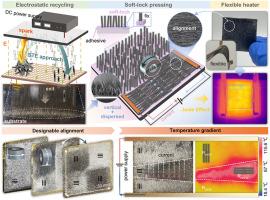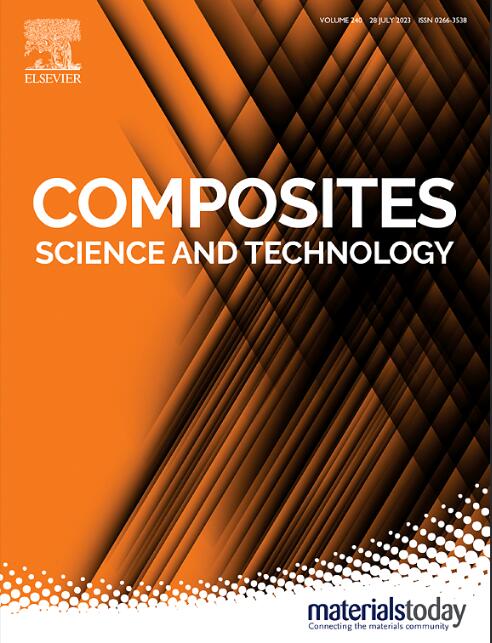通过软锁压制对再生碳纤维进行可设计的排列,用于再制造多功能柔性加热器
IF 8.3
1区 材料科学
Q1 MATERIALS SCIENCE, COMPOSITES
引用次数: 0
摘要
在再制造过程中利用再生碳纤维(rCF)是减少碳足迹和促进循环经济原则的可持续解决方案。在本研究中,我们提出了一种简单直接的通用软锁压制方法,以实现高度有序的纤维阵列的可控形成和策略排列。实验结果表明,排列有序的 rCF 阵列表面具有连续的微圆拱形形态,因而具有疏水特性。结合快速均匀的焦耳加热,基于 rCF 阵列再制造的多功能柔性加热器在防止结冰和促进低温环境下的快速除冰方面显示出广阔的前景。值得注意的是,这种方法能有效利用 rCF 的定向特性来构建温度梯度,从而增强热量分布,提高加热和除冰应用的整体性能。总之,利用软锁压制技术再制造 rCF 多功能柔性加热器代表了可持续发展、先进材料和功能设计的融合,是通过各种创新途径实现循环利用闭环的重要探索和引领。本文章由计算机程序翻译,如有差异,请以英文原文为准。

Designable alignment of reclaimed carbon fiber by soft-lock pressing for remanufacturing multifunctional flexible heater
The utilization of reclaimed carbon fiber (rCF) in remanufacturing processes presents a sustainable solution for reducing carbon footprint and promoting circular economy principles. In this study, we propose a simple and direct universal soft-lock pressing method to achieve the controlled formation and strategic arrangement of highly ordered fiber arrays. Experimental results demonstrate that the aligned rCF array exhibits hydrophobic properties due to its continuous micro-rounded arch morphology on the surface. Combined with rapid and uniform Joule heating, the multifunctional flexible heater remanufactured based on rCF arrays shows promising prospects for preventing ice formation and facilitating rapid de-icing in low-temperature environments. Notably, this method can effectively utilize the directional properties of rCF to construct temperature gradients, enhancing heat distribution and overall performance in heating and de-icing applications. Overall, using soft-lock pressing for the remanufacturing of rCF multifunctional flexible heaters represents a convergence of sustainability, advanced materials, and functional design, and is an important exploration and leadership in closing the recycling loop through various innovative pathways.
求助全文
通过发布文献求助,成功后即可免费获取论文全文。
去求助
来源期刊

Composites Science and Technology
工程技术-材料科学:复合
CiteScore
16.20
自引率
9.90%
发文量
611
审稿时长
33 days
期刊介绍:
Composites Science and Technology publishes refereed original articles on the fundamental and applied science of engineering composites. The focus of this journal is on polymeric matrix composites with reinforcements/fillers ranging from nano- to macro-scale. CSTE encourages manuscripts reporting unique, innovative contributions to the physics, chemistry, materials science and applied mechanics aspects of advanced composites.
Besides traditional fiber reinforced composites, novel composites with significant potential for engineering applications are encouraged.
 求助内容:
求助内容: 应助结果提醒方式:
应助结果提醒方式:


